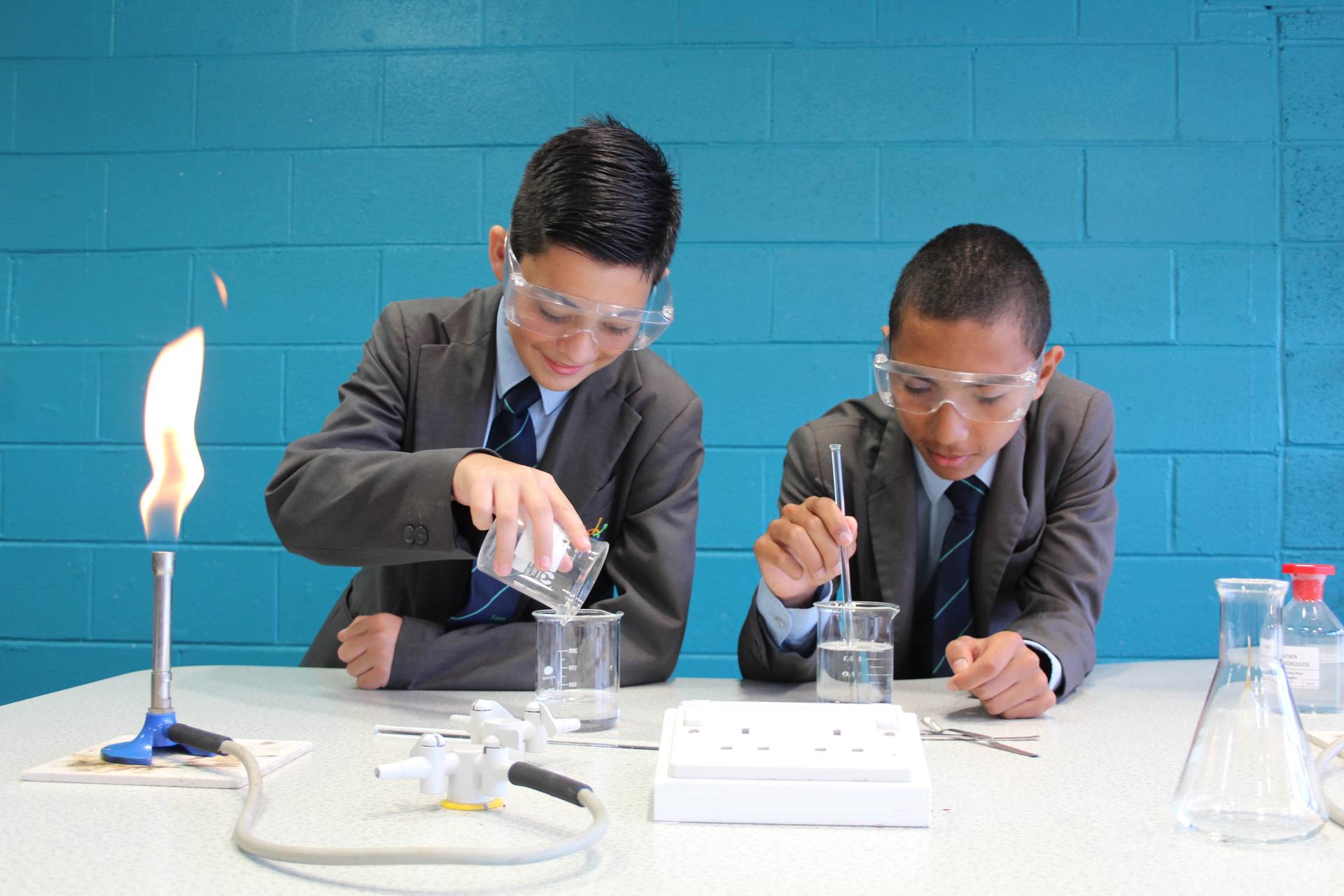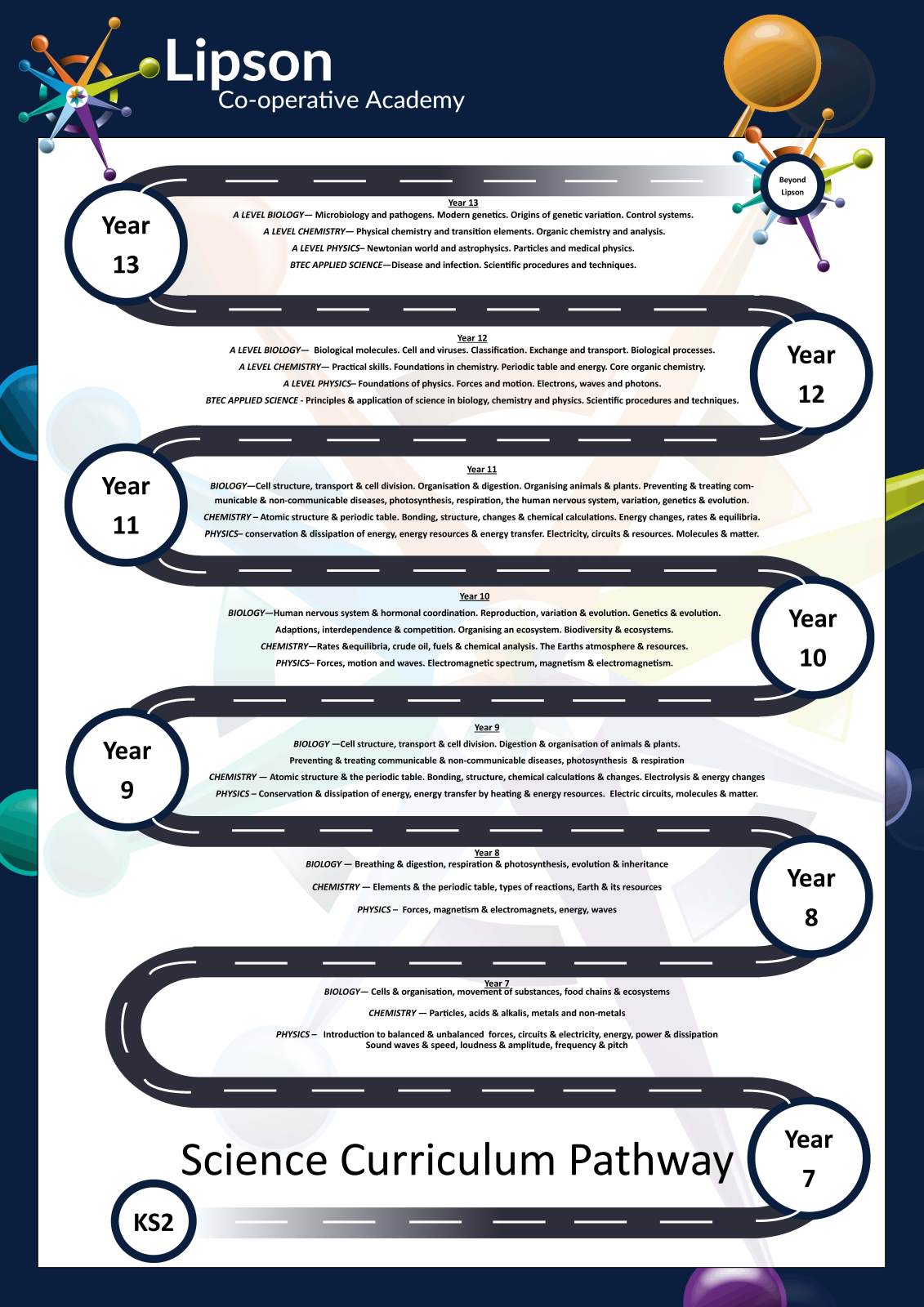Science
When you step into a science lab at Lipson, you embark on an adventure of possibility. Science ignites curiosity, interest and enjoyment in all our students whilst furnishing them with the necessary skills to successfully explore the world around them.
Science starts with an idea and then equips you with the skills to prove or disprove it. Seeing the relationship between empirical evidence and your theory helps you think critically. These important thinking skills can be applied in many areas of study and nourishes a developing mind.
Science feeds a natural love for learning. Science is hands-on, it appeals readily to most students.
Science opens doors to many disciplines. Building an aptitude for science can be helpful in other areas of study; science encourages math, creativity and argument. An interest in science is an interest in how things were once understood compared to how they are understood now so studying science also lends itself easily to studying history. And hand-in-hand with every lab experiment is the report – thus writing becomes a crucial part of science. Even the study of language itself is a part of science; its specialist terminology can be traced back to Latin or Ancient Greek.
Science prepares our students for the future. It is the basis for life. We literally eat, sleep and breathe science.
Our curriculum has been designed to enable all learners to gain skills in biology, chemistry & physics in a theoretical and practical sense.
Meet the Team
The science team are a passionate department of biologists, chemists, physicists, investigators, experimenters and researchers.
Dan Gage – Head of Science
Sam Chick – Second in department & Teacher of Science
Tony Connett - Teacher of Science
Katy Hooper - Teacher of Science
Sam Jones - Teacher of Science
Thomas Marks - Teacher of Science
Holly Bowman-Powell- Teacher of Science
Rebecca Smith - Teacher of Science
Steve Watson - Head of Year & Teacher of Science
Andrea Williams - Teacher of Science
Nikki Holmes – Teacher of Science
Kayleigh Festorazzi – Teacher of Science
Steph Rosser – Science Technician
Ildiko Rozsa – Science Technician

Building on Key Stage 2
As a department, we collaborate with our local Primary schools to identify what is being taught in Year 5 & 6 and how. Moreover, we run workshops where we explore the exciting practical nature of science- we love making lessons explosive!
Our Year 7 learning builds on the KS2 curriculum and develops students’ knowledge and skills so they are equipped with the skills that will assist them in KS4 and beyond.
Curriculum Overview (Click here)
Long Term Plan Documents
Our Curriculum Learning Pathway

Science Curriculum Pathway (PDF)
Key Stage 3
In years 7, 8 & 9 students have 3 hours of Science per week. Using the AQA Activate syllabus, the curriculum has been thoughtfully sequenced to aid learning of both scientific content and skills. Across the Key Stage, the following topics are covered which both meet and stretch beyond the National Curriculum.
|
Biology |
Chemistry |
Physics |
|
|
Cells Food chains and webs Ecosystems Genes Variation Human reproduction Breathing Drugs, smoking & alcohol Digestion & diet Respiration Photosynthesis Evolution Inheritance DNA & genetics |
Physical states Elements, mixtures & compounds Separation of mixtures Acids and alkalis Reactions of metals Earth’s structure Elements & Compounds The Periodic Table Reactions of Group 1, 7 and 0 Types of reactions Energy changes in reactions Global warming & climate change Carbon cycle Extracting metals and recycling |
Forces Speed Gravity Circuits Energy Sound Friction Magnets and electromagnets Work and energy Energy transfers Waves Radiation and energy |
|
Useful website links
BBC Bitesize - KS3 Science
Useful books
AQA KS3 Activate book 1
Philippa Gardom Hulme, Jo Locke and Helen Reynolds (Oxford)
AQA KS3 Activate book 2
Philippa Gardom Hulme, Jo Locke and Helen Reynolds (Oxford)
Key Stage 4
Students begin their GCSE journey in Year 9 with the initial topics from GCSE that are closely linked to previous learning, for example, cells in Biology and atomic structure in Chemistry and Physics.
In Year 10 & 11 students have five hours of Science a week and specialist teachers for each of Biology, Chemistry and Physics. We study the AQA Combined Science Trilogy course.
Throughout the Key Stage, students will cover the content and skills required to develop as budding young scientists and have the ability and confidence to continue their studies at the next level should they wish to.
Regular practical work will help them to develop a deeper understanding of scientific processes, which they learn to apply to the theory work that accompanies it. Content and skills are assessed via six examinations as the end of Year 11, split into the following exam papers:
|
Biology Paper 1 |
Cell biology; Organisation; Infection and response; and Bioenergetics. |
|
Biology Paper 2 |
Homeostasis and response; Inheritance, variation and evolution; and Ecology. |
|
Chemistry Paper 1 |
Atomic structure and the periodic table; Bonding, structure, and the properties of matter; Quantitative chemistry; Chemical changes; and Energy changes. |
|
Chemistry Paper 2 |
The rate and extent of chemical change; Organic chemistry; Chemical analysis; Chemistry of the atmosphere; and Using resources. |
|
Physics Paper 1 |
Energy; Electricity; Particle model of matter; and Atomic structure. |
|
Physics Paper 2 |
Forces; Waves; and Magnetism and electromagnetism |
All examination papers are 75 minutes in length and worth 70 marks.
Useful website links
Kerboodle: Lessons, Resources, Assessment, and Kerboodle Books
GCSE Bitesize: GCSE Combined Science - AQA Trilogy
AQA: Science | GCSE | Combined Science: Trilogy
Past papers: GCSE | Combined Science: Trilogy | Assessment resources
Textbooks
AQA GCSE Biology, Ann Fullick and Andrea Coates (Oxford)
AQA GCSE Chemistry, Lawrie Ryan and Ray Peacock (Oxford)
AQA GCSE Physics, Jim Breithaupt and Gary Calder published by (Oxford)
Revision guide
CGP Revision Guide (Higher Tier) SAHR46 - New GCSE Combined Science AQA Revision Guide - Higher includes Online Edition, Videos & Qui
CGP Revision Guide (Foundation Tier) SAHR46 - New GCSE Combined Science AQA Revision Guide - Foundation includes Online Edition, Videos & Qui
Sixth Form
The Science department offers a range of courses that enable students in Years 12 & 13 to continue their scientific studies. These courses are designed to continue building their scientific skills and understanding and to prepare them for their future lives, be that further study at University or if they leave education and seek employment.
An overview of each of the courses:
A Level Biology
Exam Board - Edexcel B - Biology
Year 12
Module 1: Biological Molecules
Module 2: Cells and Viruses
Module 3: Classification and Biodiversity
Module 4: Exchange and Transport
Module 5: Energy for Biological Processes
Module 10: Ecosystems
Year 13
Module 6: Microbiology and Pathogens
Module 7: Modern Genetics
Module 8: Origins and Genetic Variation
Module 9: Control Systems
Examinations
Paper 1: Advanced Biochemistry, Microbiology and Genetics,
1 hour 45 minutes, 90 marks
Paper 2: Advanced Physiology, Evolution and Ecology
1 hour 45 minutes, 90 marks
Paper 3: General and Practical Principles in Biology
2 hours 30 minutes, 120 marks
Useful website links.
Royal Society of Biology - Royal Society of Biology
Useful books
Edexcel A Level Biology Student Book 1 - Ed Lees and Martin Rowland (Hodder)
Edexcel A Level Biology Student Book 2 - Ed Lees and Martin Rowland (Hodder)
A Level Chemistry
Exam Board - OCR Chemistry A
Year 12
Module 1: Development of practical skills in chemistry
Module 2: Foundations in chemistry
Module 3: Periodic table and energy
Module 4: Core organic chemistry
Year 13
Module 5: Physical chemistry and transition elements
Module 6: Organic chemistry and analysis
Examinations
Paper 1: Periodic table, elements and physical chemistry
2 hours and 15 minutes, 100 marks
Paper 2: Synthesis and analytical techniques
2 hours and 15 minutes, 100 marks
Paper 3: Unified chemistry
1 hour and 30 minutes, 70 marks
Useful website links.
Kerboodle - Lessons, Resources, Assessment, and Kerboodle Books
Royal Society of Chemistry - The Royal Society of Chemistry
Useful books
A Level Chemistry A for OCR Student Book - Rob Ritchie and Dave Gent (Oxford)
A level Physics
Exam Board - OCR Physics A
Year 12
Module 1: Development of practical skills in physics
Module 2: Foundations of physics
Module 3: Forces and motion
Module 4: Electrons, Waves and Photons
Year 13
Module 5: Newtonian World and Astrophysics
Module 6: Particles and medical physics
Examinations
Paper 1: Modelling physics
2 hours 15 minutes, 100 marks
Paper 2: Exploring physics
2 hours 15 minutes, 100 marks
Paper 3: Unified physics 1
hour 30 minutes, 70 marks
Useful website links.
Kerboodle - Lessons, Resources, Assessment, and Kerboodle Books
Institute of Physics - Institute of Physics - For physics • For physicists • For all : Institute of Physics
Useful books
A Level Physics A for OCR - Graham Bone and Gurinder Chadha (Oxford)
BTEC National Applied Science (Level 3)
Examination board Edexcel – BTEC National Applied Science
The course consists of 4 units:
Year 12
Unit 1: Principles and Applications of Science (External Exam)
Unit 2: Practical and Scientific Procedures and Techniques (Internal Assessment)
Year 13
Unit 3: Science Investigation Skills (Externally Assessed Practical Controlled Assessment)
Unit 12: Disease and Infection (Internal Assessment)
Useful website links.
Pearson - BTEC Nationals | Applied Science (2016)
Useful books
BTEC Level 3 Nationals Applied Science Student Book - Frances Annets and Joanne Hartley (Pearson)
Pearson REVISE BTEC National Applied Science Revision Guide


